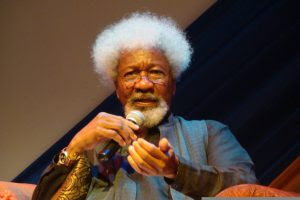Like a blue moon, Akinwade Oluwole Soyinka, Nigeria’s most celebrated literary icon and Nobel laureate made a rare appearance at the Aso Rock Villa last week.
Since his more than six decades of political activism, his visits to the seat of power had always been symbolic and in sync with the mood of the times. Although no reason was advanced for the visit, a quick glance at the photograph with President Muhammadu Buhari, which washed up in several newspapers portrays the duo in pensive mood, devoid of the chatter and pleasantness of such stately encounters.
They suggested presentiments in the mould that sent him to prison in 1967 for nearly two years, and which elicited, The Man Died, a fitting riposte to his abiding courage of conviction “that the man dies in all who keeps silent in the face of tyranny.”
Nigeria may not be waltzing through tyranny, but the prevailing economic hardship, atmosphere of mutual ethnic mistrust and suspicion, the chaotic humane social order, which have always held for him, a commitment to “justice as the first condition of humanity” are apposite. At 82, the “Kongi”, as he is sometimes called has seen through the Open Sore of a Continent.
He has witnessed the pain and trauma of A Season of Anomie, done strides in A Shuttle in the Crypt, and is well advised that You Must Set Forth at Dawn, before A Dance of the Forests sets in. Soyinka, who spared little in his verbal condemnation of the Goodluck Jonathan regime especially in the area of corruption, has so far maintained a studied silence on the Buhari administration. His appearance, like the great “masquerade” embodies a significant attraction, and has been variously interpreted.
In his politically charged tragedies; The Road, The Strong Breed and Kongi’s Harvest, not only does he challenge “the recurrent cycle of stupidities”, he also gets involved in practical politics. His political activism and fight for justice made the late General Sani Abacha’s government to pass a death sentence on him in 1997, in absentia.
Apprehension is in the air as the nation awaits his forthcoming press briefing, presumably on the state of the nation. Soyinka belongs to the rare club of iconoclasts; an esteemed class of destroyers of established order. His interventionist role at critical junctions of the nation is well documented. Very few statesmen have the imaginative focus and ‘devil may care’ drive of the Ijegba forest inhabitant, sequestered and guided by “50 spirits.”
Born on July 13, 1934 in Ake, he grew up in the Anglican Mission compound there. A precocious student, he first attended the Parsonages Primary School, where his father was headmaster, and then a nearby secondary school in Abeokuta where his uncle was principal. In 1945, at the age of 11, he was introduced into the protest movement that during the next decade won Nigeria’s freedom from British rule.
The political turbulence of these years framed Soyinka’s adolescence and early adulthood, which he chronicles in Ibadan: The Penkelemes Years, A memoir; 1946 – 1965. In 1954, he focused on theatre and travelled to Leeds to complete a degree in drama, under the well known Shakespearean critic, G. Wilson Knight.
A Dance of the Forests, a play that coincided deliberately with independence placed him at odds with the political leaders, a spectacle designed to remind citizens of the chronic dishonesty and abuse of power, which colonialism had bred in generations of native politicians.
His large body of works is known to openly challenge Nigerian authorities. His actions, which include holding up a radio station, in his search for justice led to a brief detention, trial and acquittal in 1965. He is married to Folake Doherty, a journalist.
THE SUN NEWS
